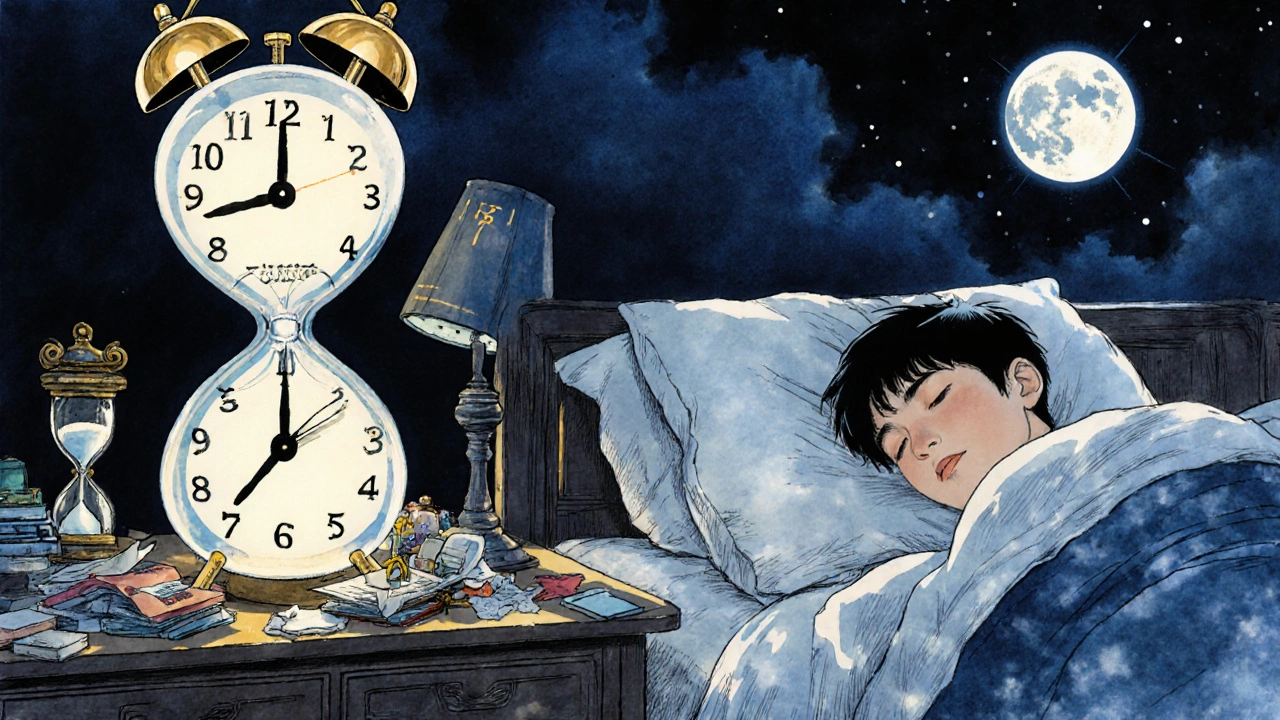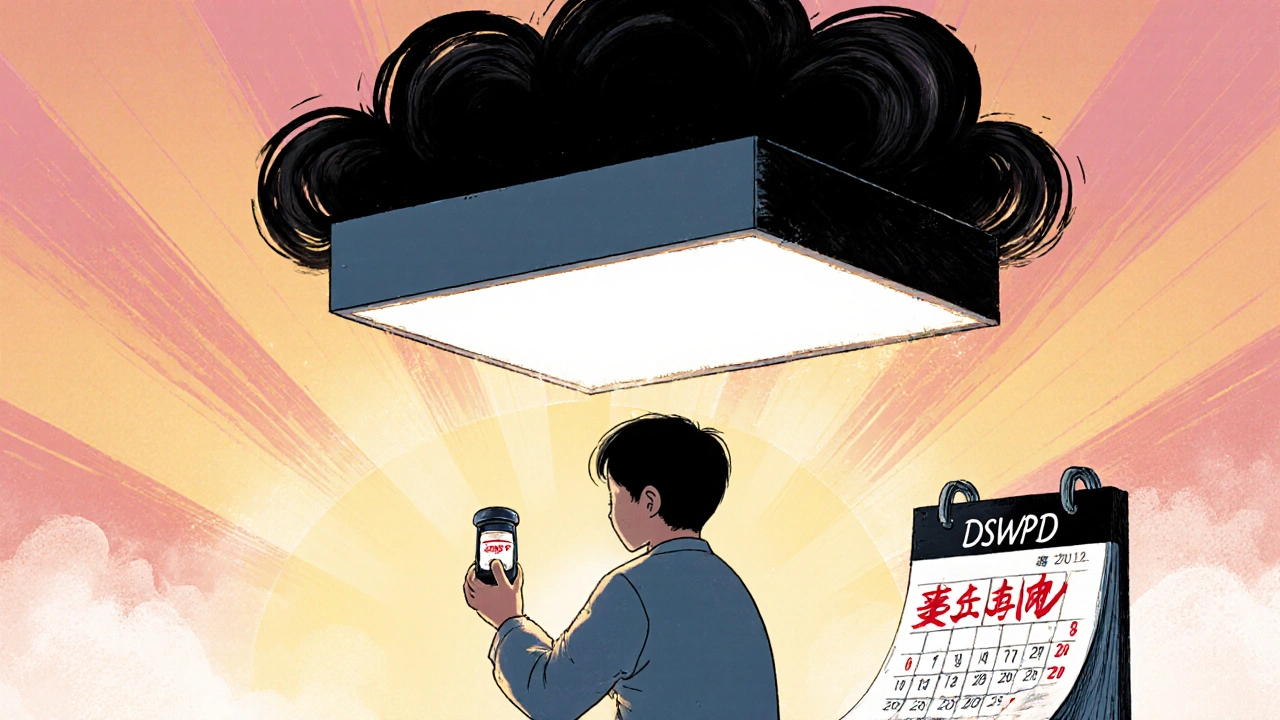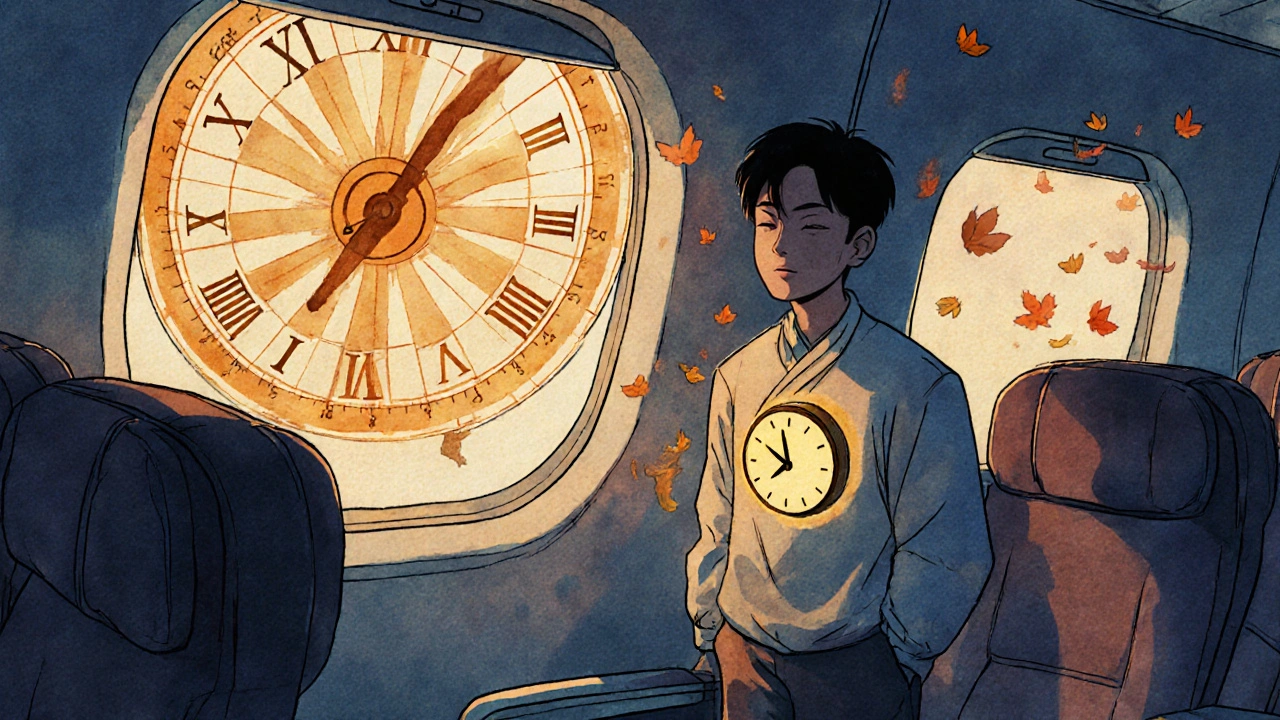What Exactly Is a Circadian Rhythm Disorder?
Your body runs on a 24-hour clock-not the kind you wear, but the one inside your brain. This internal clock, called the circadian rhythm, tells you when to feel sleepy, when to wake up, when to digest food, and even when your body temperature rises or drops. It’s not just about sleep. It affects your hormones, your metabolism, your mood, and your ability to focus. When this clock gets out of sync with the world around you, you’re dealing with a circadian rhythm disorder.
Two of the most common types are jet lag and delayed sleep-wake phase disorder (DSWPD). They might seem similar-both involve trouble sleeping at the "right" time-but they’re very different in cause, duration, and how you fix them.
Jet Lag: When Your Clock Gets Left Behind
Jet lag hits after you fly across multiple time zones. You land in New York feeling wide awake at 8 PM your body time, but it’s 11 PM local time and everyone’s asleep. Or you wake up at 4 AM local time, but your brain still thinks it’s 1 AM back home. This isn’t just tiredness. It’s your biological clock stuck in the past.
The problem gets worse when you fly east. Why? Because your body naturally wants to stay up later, not go to bed earlier. Crossing five time zones eastward can mean you’re off by up to 7.5 hours. Your body can only adjust about one hour per day when moving forward. That means five time zones east? You’re looking at 5-7 days to feel normal again. Westward travel is easier-you’re essentially extending your day, which your body does more naturally.
Symptoms aren’t just sleepiness. You might feel foggy-headed, nauseous, or have trouble concentrating. Studies show cognitive performance drops by 20-30% during peak jet lag. Business travelers report lower productivity for three or more days after long flights. And yes, many turn to sleeping pills-but that’s not a fix. It’s a bandage.
Delayed Sleep Phase: Not a Choice, But a Biology
Delayed sleep-wake phase disorder (DSWPD) isn’t about travel. It’s a persistent, biological shift in your sleep schedule. People with DSWPD don’t choose to stay up late. Their bodies physically can’t fall asleep before 3-6 AM, even if they try. They sleep well-8-9 hours-but wake up between 10 AM and 1 PM. If they force themselves to wake at 7 AM for work or school, they’re chronically sleep-deprived.
This isn’t just "night owl" behavior. It’s a clinical condition. The International Classification of Sleep Disorders (ICSD-3) defines it by a delay of two or more hours from conventional sleep times, lasting at least three months. It’s especially common in teens and young adults-up to 16% of this group have it. Genetic studies show variations in genes like PER3 and CRY1 explain why some people’s clocks run slower than others.
Imagine being a college student who gets perfect grades at night but fails every 8 AM class. Or a software developer whose best ideas come at 2 AM but is forced into a 9-5 job. They’re not lazy. Their body’s clock is simply set to a different time zone-permanently.
How Are Jet Lag and DSWPD Different?
Here’s the key difference: jet lag is temporary. DSWPD is chronic.
- Jet lag resolves on its own, usually within days. Your body re-syncs with the new time zone.
- DSWPD doesn’t go away unless you treat it. Without intervention, the delayed schedule sticks for years-even decades.
- Jet lag symptoms are worst after eastward travel. DSWPD isn’t affected by travel-it’s always the same.
- Jet lag affects anyone who flies across time zones. DSWPD affects a specific group, often starting in adolescence.
Another big difference? Sleep quality. People with DSWPD sleep just fine-if they follow their natural schedule. The problem isn’t insomnia. It’s misalignment. They’re not sleeping poorly. They’re sleeping at the wrong time for the world around them.

How to Fix Jet Lag
You can’t stop flying, but you can reduce jet lag. The key is light.
When traveling east, expose yourself to bright light in the morning. This tells your brain it’s time to wake up earlier. When traveling west, get light in the evening. This delays your clock. The rule of thumb: 15 minutes of bright light per day, timed correctly, helps your body adjust faster.
Start adjusting your sleep schedule before you leave. If you’re flying east, go to bed 15-30 minutes earlier each night for 3-5 days. If you’re flying west, go to bed 15-30 minutes later. Don’t wait until you land.
On the plane, avoid caffeine and alcohol. Hydrate. Try to sleep if it’s nighttime at your destination. Use an eye mask and noise-canceling headphones.
After landing, get outside. Sunlight is the strongest signal your body has. If you land in the morning, stay awake. If you land at night, go to bed-even if you’re not tired. Your body will catch up.
How to Treat Delayed Sleep Phase
DSWPD won’t fix itself. You need a structured plan. The American Academy of Sleep Medicine recommends three things: bright light, melatonin, and consistency.
- Morning light therapy: Sit in bright light (10,000 lux) for 30-60 minutes right after you naturally wake up. This pushes your clock earlier. Use a light box if you can’t get natural sunlight.
- Evening melatonin: Take 0.5 mg of melatonin 5-7 hours before your target bedtime. That’s usually around 9-10 PM for someone trying to sleep at 11 PM. Higher doses (like 3 mg) don’t work better-they just cause grogginess.
- Strict schedule: Go to bed and wake up at the same time every day-even on weekends. This is the hardest part. But if you sleep in on Saturday, you undo all your progress.
Studies show this three-part approach moves your sleep time forward by 2.1 hours on average over four weeks. That’s enough to shift from 4 AM to 1 AM. It takes patience. Most people see improvement after 4-6 weeks of daily effort.
Avoid screens before bed. Blue light blocks melatonin. Use night mode, wear blue-blocking glasses, or just read a book.
Why This Matters Beyond Sleep
Chronic circadian misalignment isn’t just about being tired. It’s linked to serious health risks. Long-term studies from the UK Biobank show people with untreated circadian disorders have a 29% higher risk of type 2 diabetes and a 23% higher risk of heart disease.
Why? Because your liver, pancreas, and immune system all run on circadian timing. Eating at 2 AM, sleeping during the day, or being exposed to artificial light at night disrupts hormone balance, insulin sensitivity, and inflammation levels.
Teenagers with DSWPD are more likely to struggle academically, develop anxiety, or use stimulants like modafinil to stay awake. That’s dangerous. One study found 22% of teens with DSWPD misuse stimulants, which can worsen their sleep long-term.

What Doesn’t Work
Many people try quick fixes-and they backfire.
- Overdosing on melatonin (3 mg or more) doesn’t help. It can make you groggy and disrupt your natural rhythm further.
- Using sleeping pills for DSWPD doesn’t reset your clock. It just masks the problem.
- Trying to "catch up" on sleep during weekends creates a "social jet lag" effect-your body never settles into one rhythm.
- Waiting for it to "get better on its own" rarely works. DSWPD tends to get worse without treatment.
And don’t rely on apps that promise instant fixes. Some, like Timeshifter, offer good guidance for jet lag-but they’re not magic. Success still depends on you sticking to the plan.
When to See a Doctor
If you’ve been struggling with sleep timing for more than three months, and it’s affecting your work, school, or mental health, it’s time to see a sleep specialist. They can confirm if you have DSWPD using a test called dim light melatonin onset (DLMO), which measures your body’s natural melatonin rise.
Most doctors don’t screen for circadian disorders. Only 4% of people with symptoms have been diagnosed. That means many are being told they’re "lazy" or "unmotivated" when they actually have a biological condition.
If you’re a parent, teacher, or employer-understanding this can change lives. A student who fails morning classes isn’t failing because they don’t care. Their body’s clock is out of sync with the school schedule.
What’s Next for Circadian Medicine
Circadian health is becoming a bigger focus in medicine. The FDA has approved drugs like tasimelteon for rare circadian disorders. Wearable devices now track your body’s internal clock using skin temperature and movement. Companies are starting to design work schedules around natural rhythms, not just convenience.
By 2027, nearly half of family doctors in Europe are expected to include circadian assessments in routine checkups. The goal? Treat sleep timing like blood pressure-something you monitor and manage over time.
For now, the best tools are simple: light, timing, and consistency. No pills. No gadgets. Just understanding your body’s rhythm-and respecting it.
Is jet lag worse when flying east or west?
Jet lag is worse when flying east because your body has to advance its sleep cycle-going to bed earlier than it naturally wants to. The human circadian clock runs slightly longer than 24 hours (about 24.2 hours), so it’s easier to delay sleep (as when flying west) than to advance it. Eastward travel can cause up to 1.5 hours of misalignment per time zone crossed, compared to 1 hour per zone westward. This means crossing five time zones east might take 5-7 days to recover from, while the same trip west might take only 3-5 days.
Can you outgrow delayed sleep phase disorder?
Some people do, especially as they enter their late 20s or early 30s. But for many, DSWPD persists into adulthood. It’s not something you simply outgrow like childhood insomnia. Without treatment, the delayed pattern often continues. Studies show that about half of teens with DSWPD still have symptoms as adults. Early intervention with light therapy and schedule regulation improves long-term outcomes significantly.
Is melatonin a cure for delayed sleep phase?
No, melatonin alone isn’t a cure. It’s a tool to help shift your internal clock when used correctly. The recommended dose is 0.5 mg, taken 5-7 hours before your target bedtime. Higher doses (like 3 mg or more) are common but ineffective and can cause next-day grogginess. Melatonin works best when combined with morning bright light exposure and strict sleep scheduling. Alone, it helps only about 41% of people-compared to 73% when combined with light therapy and consistency.
Why do I feel fine when I sleep late but awful when I try to wake up early?
Because your sleep quality isn’t the problem-it’s the timing. People with delayed sleep phase disorder sleep deeply and get enough hours when they follow their natural schedule (e.g., sleeping from 4 AM to 12 PM). The issue is that society expects them to be awake at 7 AM or 8 AM. When forced into that schedule, they’re chronically sleep-deprived, which leads to fatigue, brain fog, and mood problems. It’s not insomnia. It’s misalignment.
Can shift work cause delayed sleep phase?
Shift work can cause a similar problem called shift work disorder, but it’s different from DSWPD. Shift work disorder happens when your job forces you to be awake during your body’s natural sleep time (like night shifts), leading to chronic sleep loss. DSWPD is a stable, long-term delay in your internal clock that exists regardless of your schedule. People with DSWPD will still struggle to sleep early-even on days off. Shift workers often catch up on sleep during days off, while those with DSWPD cannot.

Ogonna Igbo
November 15, 2025 AT 13:10They say jet lag is worse going east? That's because your brain is too weak to handle reality. We don't have time zones here, we have life. You want to be awake at 3 AM? Be awake. You want to sleep at noon? Sleep. No one here is measuring melatonin onset like it's some kind of religious ritual.
BABA SABKA
November 15, 2025 AT 18:13DSWPD isn't a disorder-it's an evolutionary adaptation that got hijacked by 9-to-5 capitalism. Your PER3 gene variant is not a defect. It's a survival trait that got mislabeled as pathology because your boss needs you awake during corporate hours.
John Foster
November 17, 2025 AT 00:39Jet lag is a temporary exile. DSWPD is the permanent exile of the natural human being in an unnatural world. The real treatment isn't light therapy-it's the courage to reject the tyranny of the alarm clock. But who among us has that courage? We'd rather take a pill than face the truth: we're not broken. The world is.
Edward Ward
November 17, 2025 AT 10:56Also, the weekend sleep-in myth is dangerous. It's not 'catching up,' it's re-traumatizing your circadian system. Your body doesn't have a 'makeup sleep' button. Consistency isn't boring-it's biological necessity. I've seen patients shift 3 hours in 6 weeks just by fixing their morning light exposure and stopping caffeine after 2 PM. No magic. Just biology.
Andrew Eppich
November 19, 2025 AT 02:23Melatonin is a supplement, not a miracle. And light boxes? That's just expensive placebo for people who refuse to take responsibility. Wake up earlier. Go to bed earlier. Simple. No gadgets. No excuses. Your body doesn't need a PhD to tell it when to sleep.
Jessica Chambers
November 20, 2025 AT 19:49Shyamal Spadoni
November 21, 2025 AT 05:44And don't even get me started on the 'light therapy' scam. Sunlight? HA. That's just a distraction from the real enemy: the government's weather modification programs. They're changing the natural photoperiod to keep us docile. Wake up people.
Chris Bryan
November 21, 2025 AT 06:51Jonathan Dobey
November 22, 2025 AT 02:43DSWPD isn't a disorder-it's a rebellion. Your body is screaming, 'I am not a machine!' And yet, the world responds with a prescription pad. The real tragedy? Most people don't even realize they're being colonized by time. The alarm clock is the new crucifix. And we're all praying to it every morning, begging for permission to be awake.
ASHISH TURAN
November 23, 2025 AT 11:49Also, 0.5mg melatonin? That's like a mosquito bite. I take 3mg and it works fine. Who says you can't tweak your biology? If the body's clock is slow, give it a little push. Science isn't a religion.
Ryan Airey
November 24, 2025 AT 07:05And let’s talk about melatonin dosing: 0.5mg is the placebo dose. Anyone who says higher doses don’t work is either lying or has never actually tried it. The real problem? People want the results without the discipline. Light therapy? Sure. But if you’re still scrolling at 2 AM, your ‘biological rhythm’ is just an excuse for poor habits.
This isn’t medicine. It’s enabling.